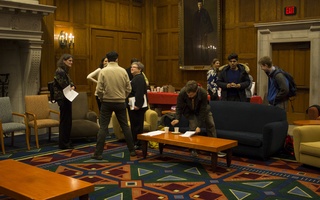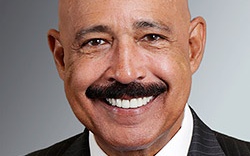When Bishop C. Holifield was a student at Harvard Law School in 1967 at the apex of the civil rights movement, the fledgling organization he had founded—the Harvard Black Law Students Association—had just two members: himself and co-founder Reginald E. Gilliam.
Nearly 50 years and six deans later, BLSA has a membership of around 150 students, the Law School has seen a marked increase in the numbers of black students and faculty, and several waves of race-related activism have swept its campus.
This weekend, generational divides were bridged as over 800 black alumni, spanning class years and professions, descended on the Law School’s campus for the fourth Celebration of Black Alumni to exchange stories, advise current students, and confer on race-related problems at the Law School and in the wider world.
While the weekend was largely festive, alumni also engaged with contemporary issues at the school such as the demands of current student activists and the enrollment numbers of black students at the Law School. In her welcome letter, Law School Dean Martha L. Minow urged alumni to visit a library exhibit on the school’s recently-retired shield and to commemorate “that legacy of Harvard Law School’s debt to the enslaved persons of the Royall household.”
The Celebration of Black Alumni was started by alumnus and Law professor David B. Wilkins in 2000 to showcase the accomplishments of black Law School graduates and entice them back to campus. He said he had observed that many black alumni previously avoided general class reunions, because of their troubled relationship with the Law School.
“For many of the black alumni, it was a difficult experience for a variety of reasons and one of them was they didn’t feel welcomed or included in the school in many ways,” Wilkins said. “[CBA] was a kind of transformative experience for people, and it gave them an opportunity to work through some of the pain that they had associated with the school, and to reconcile with themselves that the school had actually done wonderful things for them over the years.”
This year’s CBA program—which centered around the theme “Turning Vision into Action”—included speeches by alumni U.S. Attorney General Loretta E. Lynch, civil rights lawyer Bryan Stevenson, and criminal law attorney and Harvard Corporation member Theodore V. Wells.
Alumni attended a question and answer session with Minow and discussed topics including criminal justice, diversity in the legal profession, and “the blessing and the burden” of a Harvard Law degree. Organizers also presented Wells, Wilkins, and Law professor Charles J. Ogletree, Jr. with awards honoring their contributions to racial justice.
“I think what [CBA] does is it creates an avenue for a very significant portion of the legal professional community to get together to exchange notes, to exchange ideas, to help each other,” Holifield, who was one of the oldest attendees, said. “There’s a certain amount of renewal that comes from a gathering of that nature—you actually draw strength.”
For the first time, a sizable group of current students interacted with alumni over the course of the weekend. BLSA hosted a mentorship session to allow students to network with attendees and inform alumni about recent events on campus.
Over the past year, student activists with the group Reclaim Harvard Law issued a series of demands to administrators and occupied the school’s student lounge to protest what they identify as problems with the treatment of minorities at the school.
“I was proud to see so many current students there,” Wilkins said. “I also think that has something to do with the fact that there’s been a lot of activity and unrest on campus over the past year, and I think that the students were very hungry to engage with alumni, and alumni were hungry to engage with students to give students some perspective on the historical context.”
Reclaim Harvard Law members Ke’Andra Levingston and Cameron Clark—who say the movement is ongoing—gave a presentation about their activism last year to explain their demands and solicit support. Levingston and Clark sought to connect the challenges of past generations to those black students at the school face today.
“We really wanted to root it in the history of black activism at the law school,” Clark said. “We wanted to show that a lot of the things that black alumni dealt with at the Law School are still things that black students experience.”
Clark said alumni have expressed interest in supporting Reclaim Harvard Law in the form of mentorship, financial resources, and letters to the administration. Levingston and Clark also called on alumni to support other current movements across the University, including the potential HUDS strike.
But some older alumni like Wells cautioned student activists against letting protests interfere with their studies. “I have advised [activists] that they are part of this legacy of great black lawyers educated at Harvard who have devoted their lives to battling for legal justice, and they should be proud that they are part of such a legacy,” Wells said. “They should recognize that the struggle for equal justice continues and will continue throughout their lifetime… and it is important that they prepare themselves for that struggle by studying as hard as they can at Harvard Law School.”
In his keynote address, Wilkins identified low enrollment numbers of black students at the Law School and across the nation as a pressing issue, sparking conversation among alumni about how to combat the problem. Wilkins called on alumni to pay it forward by personally reaching out to prospective students and encouraging them to enroll.
“When you leave Harvard Law School, you don’t really realize the influence you have,” said
Anisha Queen, who graduated in 2014, as she recalled her preconceptions of law school as a young black student. “It was this imaginary land. I could dream about it maybe, but actually attending? Never. So just instilling in black teens that it’s not just something that non-black people do—you are capable, you do belong, and you can succeed.”
—Staff writer Claire E. Parker can be reached at claireparkerdc@gmail.com. Follow her on Twitter @ClaireParkerDC.
Read more in University News
Nobel Laureate Aung San Suu Kyi Receives Award As Students Protest















